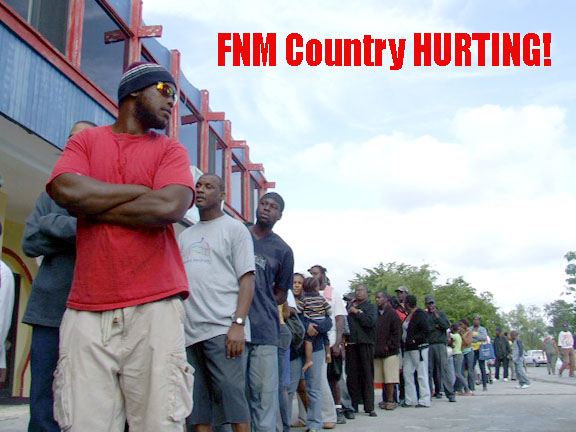
FAMILIES EARNING UNDER $5K YEARLY INCREASE BY 83%
By NEIL HARTNELL/ Tribune Business Editor
THE NUMBER of Bahamian households surviving on less than $5,000 per year has increased by an “alarming” 83 per cent in the past four years, Department of Statistics data shows, indicating the recession has most impacted those who “could least afford to be affected”.
Figures taken from the Department’s 2007 and 2011 Labour Force surveys, and supplied to Tribune Business yesterday by a private sector contact, show that at all income brackets – from $100,000-plus to between $0-$5,000 – there had been a steady fall of Bahamian families into a lower earning category, further evidence of the recession’s toll on pay and earnings.
By far the most striking comparison between the years 2007 and 2011, the former representing the recession’s start, is the 3,620 jump in the number of Bahamian families surviving on less than $5,000 per year. This jump – from 4,355 in 2007 to 7,975 in 2011 – represents a startling increase.
“By any reasonable measure, that is poverty,” Tribune Business’s source said of those earning less than $5,000 per annum. Winston Rolle, the Bahamas Chamber of Commerce and Employers Confederation’s (BCCEC) chairman, also described this as “very alarming” when contacted by this newspaper.
Agreeing that the data comparisons showed the impact of the recession, and the rise in unemployment and reduced incomes, on Bahamian society and the family unit, Mr Rolle added: “A lot of those households are driven by a single income for the most part, so any loss of income for that bread winner has a drastic effect on the income of the household, which is a big issue.
“It also goes to show the persons most affected by the recession were those who could most ill-afford to be affected…. The persons at the bottom end are feeling it the most, because there’s nowhere else to go to.”
When it came to the number of Bahamian households earning $20,000 or less, comparisons between 2007 and 2011 showed they had increased from 24,780 to 33,015 – a increase of one-third or 33 per cent.
Suggesting this was further evidence of the squeeze being imposed on the Bahamian middle class, the Tribune Business contact who provided the data said: “This is hardly a level of income which can support a middle class standard of living. This would appear to be evidence of a significant reversal in the upward movement of households towards the middle class, and away from abject poverty.”
The income bracket that has been the most stable during the recession was the largest, the $20,000-$40,000 per annum income category. Populated by 30,305 families in the 2007 Labour Force survey, their numbers had only dropped to 29,110 by 2011.
This suggests, based on the data seen and corroborated by Tribune Business, that while many Bahamian families may have dropped out of the middle class, their ranks have been replenished by falling higher income earners.
The number of families earning incomes higher than $40,000 fell from 48,370 to 38,305 between 2007 and 2011, a decrease of some 21 per cent, the Department of Statistics data shows.
Mr Rolle told Tribune Business that the household income declines showed the vicious circle that held the Bahamian business community squarely in its grip. Consumers, because they had less disposable income, were spending less with Bahamian firms. In turn, those firms were earning less, forcing them to cut working hours and lay-off more employees.
“This has a direct impact on consumers’ ability to spend and support businesses that are locally based,” the BCCEC chairman told Tribune Business. “The very few monies or reduced income they have has to be spent on basic needs. It obviously impacts the overall business community as a whole.
“It also goes to show the widespread impact of the whole recession. It’s evident that persons from all walks of life appear to have been affected by it.”
Mr Rolle said there was little sign of “a significant reversal” in the economic climate taking place currently. But he added that all other countries, not just the Bahamas, were being impacted by the global economic climate.







